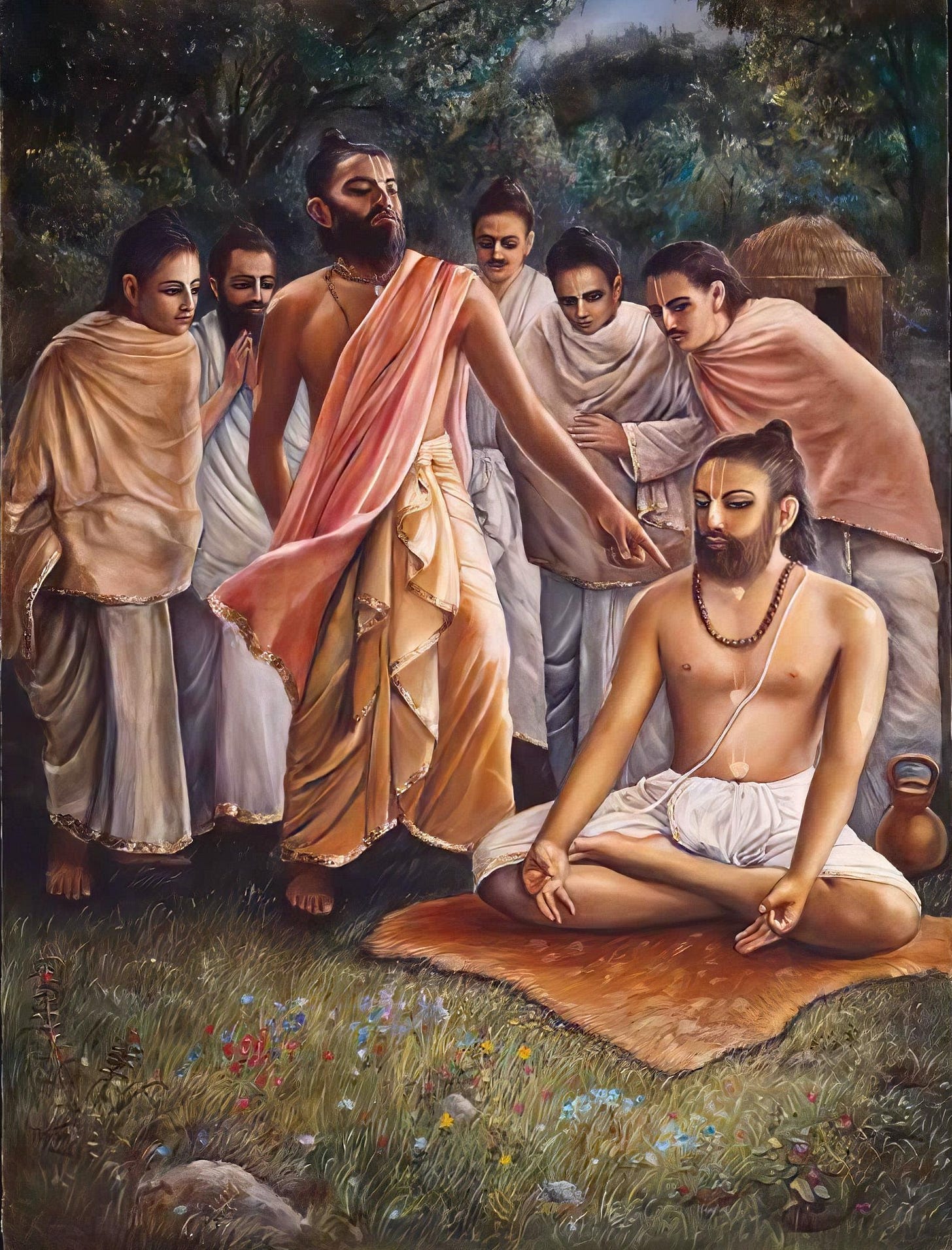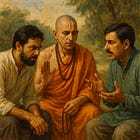What to do when senior devotees don't act properly?
As time passes, we begin to see that devotees also have imperfections. The real challenge comes when we see senior devotees, who are often practicing for 20 or 30 years, acting in questionable ways.
When we start practicing Krsna Consciousness, we often think all devotees are saints. Compared to the problems of general society, the community of devotees may appear like a perfect society, just as Śrīla Prabhupāda describes in his books.
However, as time passes, we begin to see that devotees also have imperfections. Not all devotees are kind; everyone has bad days, and not everyone is completely honest. In fact, many of the same challenges we find in ordinary relationships can also appear in devotee circles. This is natural: devotees are also human, and chanting for a few years does not automatically erase all material conditioning.
The real challenge comes when we see senior devotees, who are often practicing for 20 or 30 years, acting in questionable ways. They may lack humility or consideration, struggle with relationships, appear impersonal or dismissive, show little compassion, or seem to be low in empathy. How can we make sense of it without losing faith?
We can also learn from bad examples
The first point to consider is that everyone can make mistakes, depending on how we define "mistake". Even Krsna is sometimes criticized for breaking His promise or marrying many wives. This shows that even the Supreme Lord can be misunderstood if judged superficially. What to say about conditioned souls?
As one advances in the spiritual path, one is supposed to commit fewer mistakes than he or she would do otherwise, but mistakes will continue until a very high platform. Even then, when one really attains a platform of purity, one will probably still be perceived as committing mistakes because others may misunderstand their actions or intentions. For example, Śrīla Prabhupāda is still criticized for statements on women or social issues, often by those who lack proper context.
A more helpful approach is to observe, rather than judge. Sometimes senior people may be acting under different principles and priorities we are not familiar with, and by observing, we can learn something. Sometimes they may commit mistakes due to human imperfections, and if we are introspective enough, we can also learn from that.
Once, Brahma created a daughter called Vāk, the predominant deity of speech. Somehow, Brahma became attracted and started following her, which led Marīci and his other sons to voice their condemnation.
It's difficult to understand how a great personality like Brahma (who doesn't even have a gross body like ours) could be inclined in such a way, but Srila Prabhupada offers a possible explanation in one of his purports:
"It might be that Brahmā wanted to warn his subordinates about human frailties in their dealings with women. This is always very dangerous for persons who are on the path of self-realization. Therefore, great personalities like Brahmā, even when in the wrong, should not be neglected, nor could the great sages headed by Marīci show any disrespect because of his extraordinary behavior."
In the Bṛhad-Bhāgavatāmṛta, Srila Sanātana Gosvāmī mentions that often great personalities commit mistakes to call our attention to mistakes we can also commit and their results. Brahma becoming attracted to his daughter led him to be condemned by his sons, Bharata Maharaja becoming attached to the deer led him to take two additional births before going back to Godhead, and so on.
That's surely a nice way to see it. If we can learn from the mistakes of senior persons and save ourselves from committing the same mistake in the future, this can surely be positive, and we can thank them for that.
Conditioned nature
A second point is conditioned nature. With a few exceptions, as long as we live in this world, we serve Krsna using the material body and conditioned nature that we acquire as a result of our birth, upbringing, past experiences, traumas, etc. Each devotee comes to Krsna Consciousness with a certain package, and while spiritual practice gradually purifies it, the pace and order in which certain qualities change can vary. The process of anartha-nivṛtti that gradually purifies the heart is neither quick nor uniform. One may be able to give up intoxication, but still struggle with pride, overcome lust, but speak harshly, and so on. Anyone who practices Krsna Consciousness will become a better person than they would be otherwise, but it also depends on where we start and the pace we are advancing.
Certain qualities are very deeply rooted and may not change even in very advanced stages of devotional practice. Some are overly intellectual, others socially awkward, emotionally distant, lacking empathy, and so on. When a certain characteristic is very prominent in one's physique, it may persist even after many decades of practice. The natural progression in such cases is that instead of giving up these traces, one may find ways to use them in their service. We can then have someone who lacks social warmth but becomes very absorbed in chanting or studying, for example. Often, we just are what we are, and we have to learn to dovetail it with Krsna.
Another point to consider is that more often than not, we face difficult situations in life, including loss, betrayal, and so on, and people who lived longer usually carry a heavier load. Often, devotees who have been around for more time are the ones who have experienced more of it, and this can have a lasting impact on the way they relate to the world. There are many episodes in the story of the world and of our movement that may affect us just by hearing about; we can just imagine the effect on someone who was there. Often, devotees just withdraw, concluding that interacting with society is just not worth it, or stop trusting people. From there, they may continue practicing and developing internally, but their external behavior may not be the most amicable. When we see someone like this, it helps to keep in mind that there may be reasons for it.
Krsna Himself shows compassion in the Bhagavad-gītā, mentioning that, "Even if one commits the most abominable action, if he is engaged in devotional service he is to be considered saintly because he is properly situated in his determination. He quickly becomes righteous and attains lasting peace. O son of Kuntī, declare it boldly that My devotee never perishes."
The meaning is that one can show all kinds of material faults, but as long as one has devotion to the Lord as his or her core identity, one is still accepted by Krsna, and one's spiritual advancement continues. It may take time, but because of Krsna's protection, one eventually gets there. Indra often commits serious mistakes, such as killing Viśvarūpa, his spiritual master, and even trying to destroy Vṛndāvana, together with all Krsna's associates. Still, Krsna accepts him as a devotee and continues to help him.
In short, the process of becoming free from our conditioned nature is longer than we may assume in the beginning. Normally, the process can take several lives. Therefore, it is not surprising if someone may show undesirable traits even after decades of practice. Some advance faster, others go more slowly; it is an individual process. Different devotees will have different positives and negatives, and therefore, it helps when we see both together. One may be harsh, but reliable, another may be socially aloof, but know the scriptures well, and so on. It is easier when we see their sincerity in serving Krsna, instead of judging based on external patterns of behavior they can't easily change.
When we see seniors as human beings, instead of role models we have to obey unconditionally, it becomes easier to overlook their imperfections, just as we hope others may overlook ours.
An old joke is that once a devotee reached Goloka Vṛndāvana and was surprised to see all the devotees he thought would never make it there. How could it be possible? The one who was always speaking badly about others, the socially awkward, and even the one who never had time for anyone. The others were equally surprised to see him there; they also thought he would never make it!
Adjusting expectations
Finally, there is another important factor: stereotypes. Sometimes we have expectations of what a "pure devotee" should be: endlessly compassionate, available, gentle, and faultless. But reality is more complex. Often, one may have pressing responsibilities and a tight schedule. Prabhupada used to be available to people in the beginning, when he was still trying to establish his movement and had more free time. However, later, he was prioritizing writing his books and dealing with pressing issues, and could not make himself as available as before. Even his disciples often struggled to get a short meeting. The defining quality of a pure devotee is that he or she will always be engaged in serving Krsna. Other characteristics may vary according to different factors.
A final point is that although we should respect any senior person (if nothing else, we can at very least appreciate that they are chanting the holy names longer than us), we don't have to be closer to, or receive instructions from persons we don't like or trust. These two things don't necessarily have to come together. Respect should be given to everyone, but we can choose with which devotees we may want to relate closely or not. We should respect a policeman, but this doesn't mean we have to live with him in his house. Just as we choose who to be friends with based on affinity and other factors, we can choose which seniors to be close to or not. When we learn to separate these two factors and respect people at a distance, everything becomes much easier.
Keeping away from the dark side
What is essential in these situations is to avoid developing a negative mentality that will adversely affect our consciousness. Nourishing anger and hate is like drinking poison and expecting that someone else will die. These are things that poison ourselves. When we go on this path, we can very quickly start to generalize, assuming that everyone is like that, that the process doesn't work, that the whole institution is corrupt (since often people of less than stellar character are found in positions of leadership), and so on, which pushes us in the direction of isolation and bitter criticism. Adjusting expectations and avoiding blanket judgments can go a long way.
We have to answer for what we personally do, not for others. If someone is acting in improper ways, senior or not, it’s he or she who will have to answer for that, not us. There is thus no reason to become agitated. By observing the negative effects, we can learn from the bad example, and this can also help us grow.
Devotees are on a journey, just as we are. Conditioned nature, past scars, and different temperaments all shape how devotees appear externally. Even advanced devotees may not always fit our expectations of saintliness. The key is to respect their dedication to the process, learn from both their strengths and weaknesses, and keep our faith rooted in worshiping Krsna, chanting the holy names, and trying to understand the philosophy, instead of personalities or appearances.
When we adjust our expectations and avoid blanket judgments, we can remain steady in our spiritual practice. When we do that, instead of shaking our conviction, others’ imperfections can teach us patience and humility.
Two dangerous mistakes we often make in spiritual life
Two dangerous misunderstandings we may have in spiritual life are to expect all devotees to be perfect and to demand that all devotees be perfect.
If we expect all devotees to be perfect, we may blindly follow and trust everyone without proper discrimination. This makes one vulnerable to being exploited by people of dubious character, as well as by devotees who may have good intentions but may lack the common sense and experience necessary to engage others properly. We then become hurt or feel betrayed, and this makes it difficult to trust others in the future, creating a pendulum effect that brings us to the other extreme: thinking that devotees are all bad, that no one can be trusted, etc.
This can, in turn, easily lead one to stop or downgrade his or her spiritual practice. We can see that many don't associate with devotees anymore because of bad experiences they had at some point in the past. Most of us will face some kind of let-down at some point, and our reaction to it will determine much of our success in our spiritual practice in this life.
Another problem we may face is to demand that all devotees be perfect. While the first problem comes from ingenuity or naivety, the second comes from pride. In this case, one thinks that he or she is very advanced and thus expects that others will fit into idealized roles. When one sees that devotees don't fit into the stereotypes he or she created, one starts to criticize and eventually leaves.
We can see that both are problematic and lead to a similar result: loss of devotee association and spiritual stagnation.
It's not possible to have a worldwide movement composed of only perfect people in this material world. Even during Satya-yuga, people had faults and would be propense to anger and other faults (like in the case of Suruci, the stepmother of Dhruva Maharaja), what then to say about the age we live in? Even if such a perfect society existed, it would not help us much, because we would not be accepted in it, since we are not perfect ourselves. One example is that there is, in fact, a society of perfect sages somewhere in the Himalayas, in Badarīkāśrama, where Śrī Nara-Nārāyaṇa, Vyāsadeva, and others live. However, this is a higher-dimensional space, to which regular mortals have no access. It is exactly because of that that it remains a society of perfect individuals.
Although perfection is always the goal, our Krsna Conscious movement was never envisioned as a perfect society, nor will it ever be perfect, at least as long as we are in this material world. Srila Prabhupada explains that our movement is like a hospital, where, except for a few doctors, everyone is sick to a greater or lesser degree. In other words, it's a place where sick people go to be treated in association with other sick people. There are sick people inside, and there are sick people outside; the only difference is that the sick people inside are being treated and are gradually becoming better, although the process demands a lot of effort and may take longer than we initially expected. Doctors and nurses are also human, sometimes tired or imperfect, but the hospital is still the right place for healing. We don’t abandon treatment because other patients cough or misbehave.
The value of a spiritual society is not in being perfect (which it will never be) but in the presence of a few dedicated devotees who can help us to progress.
The proper understanding is to accept that just as we have faults and are propense to commit mistakes, others also have faults and are propense to commit mistakes. Just as we hope to be excused when we cause trouble to others, we should also be able to forgive others who, due to ignorance or negligence, cause problems for us.
Once, a very angry devotee came to Srila Bhakti Thirta Swami to share her complaints about the behavior of other devotees and the problems they had caused her. After she finished her complaints, Bhakti Thirta Swami said: "Yes, I agree completely with you, this is terrible, I agree you should never forgive them for what they did, but with a condition: Only if you also never did anything bad to anyone else. If you ever did something bad to others, then you should forgive them, just like you expect others to forgive you."
Although forgiveness is often not easy, it is the only path to eventually becoming free from this material world. We can see that this topic is not only discussed in Vaiṣnava literature but was also taught by masters of other traditions, like Christ. Although Aśvatthāmā killed Draupadī's sons, she chose to forgive him, instead of having him killed. Of course, Aśvatthāmā didn't learn the lesson and used the opportunity to try to kill Parīkṣit in the womb, which in turn led him to be cursed by Krsna to suffer for 3,000 years, but Draupadī didn't have anything to do with it. Forgiving someone doesn't free him or her from one's karmic debits, but it makes us free from further connection. After being forgiven by Draupadī, Aśvatthāmā continued his path, suffering for the results of his actions, but Draupadī became disconnected from it. She didn’t have to be in contact with him, nor carry him in her heart. Without learning to forgive and being forgiven by others, it's extremely hard to find our way back to Godhead.
What struggles do you face in your spiritual life? Post in the comments below ⤵️
Read also:






Very nice and relatable article. From personal experience, one of the worst thing we could do in our spiritual practice is to be very relaxed with our seniors because their "imperfections" become glaring to us or they have developed genuine humility after half a century of practice.
Speaking as someone very junior who finds their spiritual shelter in senior devotees, this complacency is a slow poison that warps our perception of all senior devotees negatively. As fanatical as it may sound, making the effort to develop humility and respect towards all your seniors (even if from a distance) really nourishes your spiritual life.
Even just making a sincere effort to develop such humility in the face of adversity really pleases Lord Krsna and His devotees. Thus the essence of Bhakti is personalism instead of impersonalism, the nectar being is that each devotee is very individual.
Wonderful and full of helpful advice and reminders. Thank you Sir.🙏🏼
I love this: "We don’t abandon treatment because other patients cough or misbehave."
Yes, the world is full of sick people. That's why we're all here. But we are blessed to know we have a problem! And that there is a solution! 🙏🏼